I ran into Abigail Scott Duniway the other day.
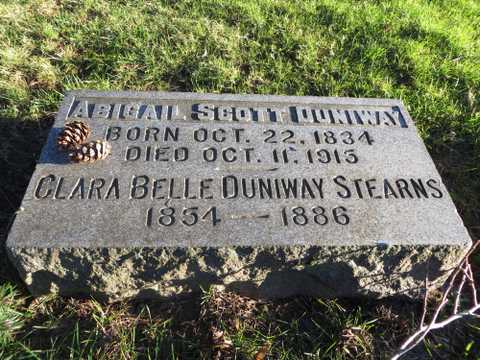
It was a chance meeting. A walking tour had brought me to Riverview Cemetery and the author made mention of her while listing the famous permanent residents. I thought, well, as long as I’m in the neighborhood, it would be rude not to stop by and say hello. Word travels slow underground and she may not have heard about the bridge.
As most of you have heard by now, the Abigail Scott Duniway is one of four possibilities in consideration for the name of the new pedestrian-bicycle-transit bridge over the Willamette River. The other names are nice, to be sure: You’d have to be a Death Eater to oppose the populist Tillicum (“Bridge of the People”), and Wy’East is also swell. Cascadia Crossing is perhaps a more appropriate appellation for a suburban freeway junction outlet mall, but I think we could all get on board with it if they agree to include a Panda Express at the span midpoint. As far as bridge names go, these options are fine.
Abigail Scott Duniway was a heavyweight class badass, however, and I believe that’s the name we should put on our new bridge.
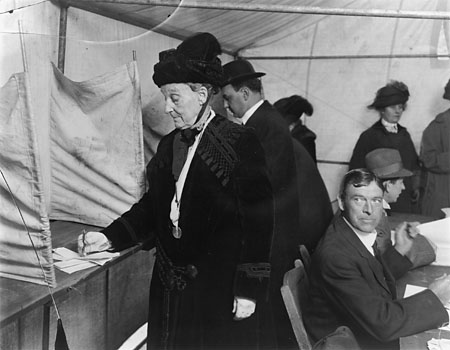
Duniway was born into a country where well over half the people had no say in their society. In a time when her voice was considered irrelevant, Abigail used it nonetheless to claim basic civil liberties for all Oregonians. She spoke, wrote, testified, and traveled across the state for decades to achieve equal suffrage for men and women. She campaigned in Idaho and Washington, too – and was largely responsible for winning equal suffrage there.
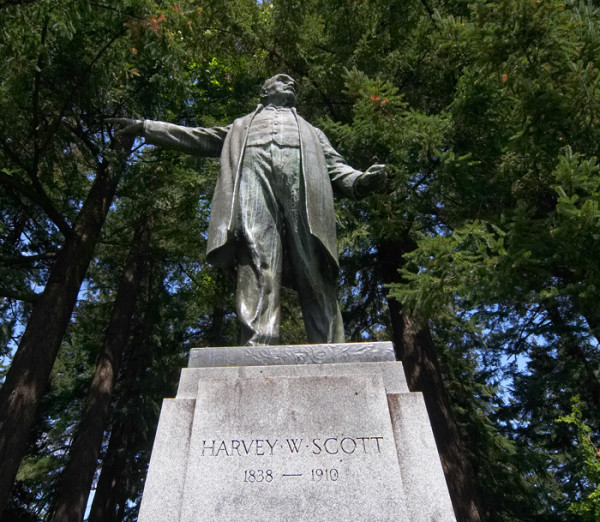
Photo credit Portland Ground: Pictures of Portland Oregon – used by Creative Commons License
Her fight in Oregon was made harder by the fact that the editor in chief of the Oregonian – her brother, Harvey W. Scott – was adamantly against equal rights for men and women. With the state’s preeminent daily newspaper as his soapbox, he attacked and ridiculed the idea relentlessly through editorials and articles. (We named an elementary school and a volcano for him, by the way.)
But Abigail started her own newspaper, the New Northwest, and used it to push back. Women’s suffrage came before a vote in Oregon in 1884.
It failed. But Duniway kept writing.
It came to a vote again in 1900. And failed. Duniway kept fighting. So did Harvey W. Scott.
It came to a vote again in 1906. And again in 1908, and then again in 1910. It failed every time.
But Abigail Scott Duniway did not give up. She kept writing, campaigning, traveling, and lecturing for 40 years to give all Oregonians an equal say in how their future should unfold.
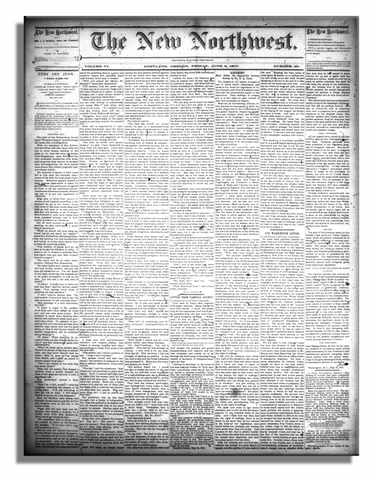
And when Scott finally died, Duniway was still fighting. After four decades of struggle to change the tides, she was the last man standing. Without Scott, the Oregonian shifted to her support and aligned itself with what was by now popular opinion. Abigail Scott Duniway had fought the Oregonian in a duel (of ideas) to the death – and won. Women’s suffrage came to the ballot again in 1912 and it passed.
And what a victory it was for all of us.
Consider what our region would be today if it had been deprived of the creativity, passion, and leadership of half of its population since 1910. Consider the strong minds and voices that we have all benefited from and what we would have lost if we’d been without them. Think, for example, of Ellen Vanderslice, who showed our city a new way to do public process. Think of Representative Shemia Fagen, bringing home the sidewalk funding bacon for East Portland.
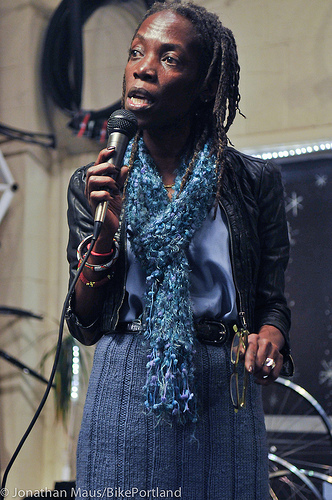
Photo credit Jonathan Maus/bikeportland.org
Think of Jo Ann Hardesty, President of the Coalition for a Livable Future, calling out the destructive folly of the CRC at in the early days when other environmental and active transportation advocacy groups we relied on were silent. Think Lake McTighe of Metro, guiding the development of the Regional Active Transportation Plan, Mia Burke laying the early groundwork for our city’s bicycling framework or Vera Katz‘s leadership in the city and the Oregon House of Representatives. Would we all still be on a first-name basis with Oregon Walks, or would grassroots group Better Block PDX still have launched if half of our population were kept out of the public process?
It’s possible. Not all of these contributions are dependent upon being able to vote or run for office. But it’s far less likely that all of these people would have committed themselves to the betterment of a society that insisted that they had no importance in it. And it’s undeniable that our society is a stronger when everyone is empowered to participate and push for progress together. Duniway claimed a huge prize for Oregon.
As the first bridge in the country to carry only transit and people-powered traffic, this new crossing represents some bold and powerful ideas. It deserves a name as big as these ideas. As we struggle through this world, we all deserve a reminder from time to time that we can change old ideas – that we can move forward and be better and stronger for that struggle. Name the bridge for Abigail Scott Duniway, who fought and won a victory that all Oregonians share, and remember with every ride over the river that persistence and passion can pay off.

Note: You can submit comments to the bridge naming committee until March 1st at 5 PM.
*** I’d like to see the Hawthorne Bridge colloquially referred to as the Workin’ Kirk Reeves Bridge. That was the bridge that he loved.
6 responses to “Editorial: The Name for the Bridge”
So, in 40 years, the Oregonian will be on the right side of the issues of 2014?
Hawthorne is Hawthorne. To designate otherwise erases a hundred years of Portland history, and stinks of revisionism. Let’s not mess with that one.
Working Kirk Reeves is a much better name for this new bridge. It is a much more Portland name.
Name a new Capitol building or other structure applicable to suffrage – like the elections department buildings or something – for Miss (Mrs?) Duniway.
Working Kirk is an awesome name for a bridge.
Or — maybe name the bridge after Miss (Mrs?) Duniway – maybe the Abigale Scott Duniway Suffrage bridge. But name a transit stop for Working Kirk.
“Take the orange line over the suffrage bridge and get off at Working Kirk”.
I like that…
The other options are lame.
Something tells me that she would prefer “Ms”.
Something tells me that Duniway, Reeves, and many others would prefer a term other than “lame”
Maybe if we had photograph of Abigail in her youth when she dreamed of joining the baudy French can-can dance review but thought that notion through thoroughly and thought again?
2014 is the 100th year of the election in which Abigail Scott Duniway voted for the first time. She was, as I understand it, the first woman to vote in Oregon and it was in 1914. Naming a bridge after a woman that formed and crossed many bridges is very appropriate and is in sync with Oregon’s sense of history, especially this year.